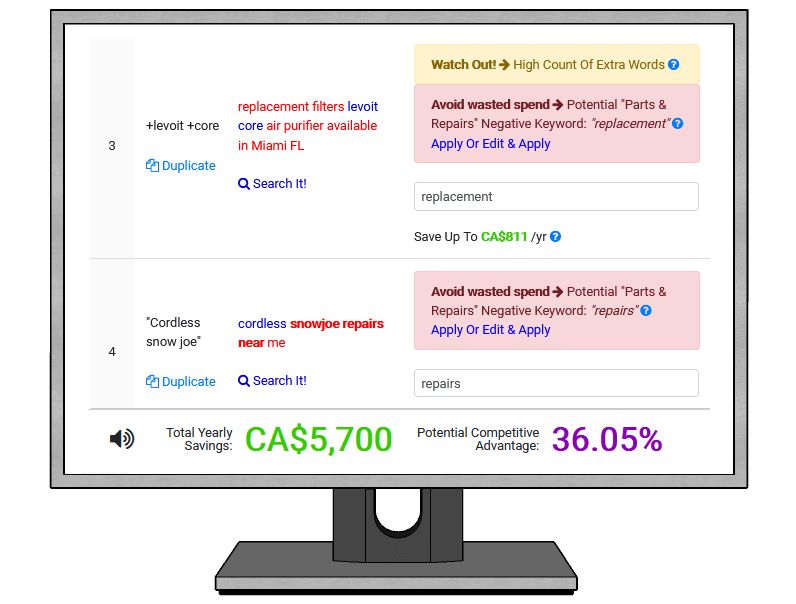Negative Keywords should be regularly identified in your Search Terms and added regularly to your Negative Keyword List or as Campaign negative keywords to avoid paying for irrelevant searches, saving you money. But they are not just about saving money. By steering your Google Ads campaign away from irrelevant searches, they have many other beneficial effects. They can improve your quality score, boost your CTR and slowly but surely allow you to leave your competitors in the dust.
Here are 5 reasons why:
1. They Boost Your Click-through-rate (CTR)
When your ad shows for a query that is truly relevant to what you offer, searchers are more likely to click on it, right? But when your ad show for queries that are not really what you are offering, people are less likely to click on them. Therefore, adding negative keywords boosts CTR because:
- Negative Keywords reduce the amount of ads shown for less relevant search queries
- Therefore, it reduces the times when users are less likely to click on your ads.
- What then remains is ads shown for relevant queries, on which users are more likely to click.
- So, more ads shown for highly-clicking queries and less shown for less-clicking queries means more clicks for each ad shown, therefore a better click-through rate.
2. Negative Keywords Help Raise Your Quality Bonus
We already established that finding and adding negative keywords forces Google to show your ads only for relevant search queries, which boosts CTR. And that’s quite good for your quality score because both relevance and “expected CTR” are key components of Google’s quality score.
In fact, according to an article published by Search Engine Land, 39% of your keywords’ quality score is determined by your expected CTR, which Google derives from your recent CTR history. Therefore, the more your ads get clicked on for a certain keyword (because you ruled out irrelevant search queries), the more your quality score is likely to go up.
Negative keywords may also play a role in other components of the quality score equation. Ad relevance, which accounts for 22% of your quality score, is also likely to go up if you exclude search terms that are not really related to what you are offering, especially those search terms that are not really reflected in your ad copy.
Finally, the same can be said, to a certain extent, of the third component of quality score, landing page experience, which accounts for 39% of the formula. Again, irrelevant search terms are likely to not be found on your landing page. So, by excluding them, you make sure that mostly only the terms relevant to your landing page trigger your ads, making your landing page more relevant.
3. They Allow You To Raise Your Bid At No Additional Cost To You
Let’s say you were already achieving a 2 for 1 return on ad spend (ROAS) and spending $1000 per month, but you had irrelevant search queries that made you waste 20% of your ad spend every month. If you now add negative keywords to prevent those irrelevant search terms from showing your ads, you will save… 20%, or $200. Good for you!
However, just enjoying the savings is rarely the best business decision to make. If you want to grow your business, the best reaction to those newly-found 20% savings is to raise your bid by approximately 20% (We say approximately because things are never that simple. It may be 18%, it may be 22%, but you can raise your bid because you are now saving and likely to achieve the same return because the search terms you excluded were irrelevant anyway.)
Once you find the correct bid raise, you will end up getting more of the good traffic (and less of the bad one) for the same $1000 per month. Those $1000 will now bring in more relevant clicks and more sales. You’ll have successfully raised your bid (and outbid the competition) at no additional cost to you.
5. Negative Keywords Speed Up Smart Bidding’s Learning Curve
Obviously, since negative keywords help bring more relevant users, they are more likely to convert. Your leads to more conversions more quickly, which helps conversion-based smart bidding strategies learn faster, in particular Maximize Conversion and Maximize Conversion Value.
Faster smart bidding learning is great, because it prevents Google Ads from having to spend tons of clicks on unlikely prospects before it finally learns what works and what doesn’t work. Yes, smart bidding would eventually figure out that the wrong search terms yield no results, but after a while, at a very high cost.
6. (Bonus) Adding Negative Keywords Opens Up Access To New Search Terms
As we’ve learned already, once you eliminate wasted spend and focus on the relevant clicks only, you can afford to raise your bid at no extra cost. Yet, that new higher bid gives you access to new search terms for which you were not bidding high enough earlier.
Among those new search terms, there will be new potential negative keywords and that’s why it’s crucial to check your search terms for negative keywords ongoingly. Even one year after launching a campaign, we usually still find plenty of new irrelevant search terms that should be excluded with negative keywords.
Negative Keywords Are Simply The Easiest Way To Distance Yourself From Your Competitors
Wanna win at Google Ads? You can raise your bid, you can try to come up with the best ad copy ever written, or you can hunt for new exotic keywords to bid on. But nothing is as easy a fast track as just carefully screening your search terms and excluding irrelevant queries.
And if you do it, or if you get in the bandwagon and start doing it today, you are in luck because the vast majority of Google Ads advertisers just don’t do it because it is too much work. So, why did we say easy?
Yes, it is too much work. Unlesss… (and here comes the shameless self promotion moment), unless you use Ultragranular. Ultragranular can quickly scan 10,000 search terms (a task that would require hours with a spreadsheet) and show you the 200 most important ones first, those more likely to require your attention. It’s a tremendous time saver and a game changer for negative keyword hunting.

Try it now for free, it’s addictive.
